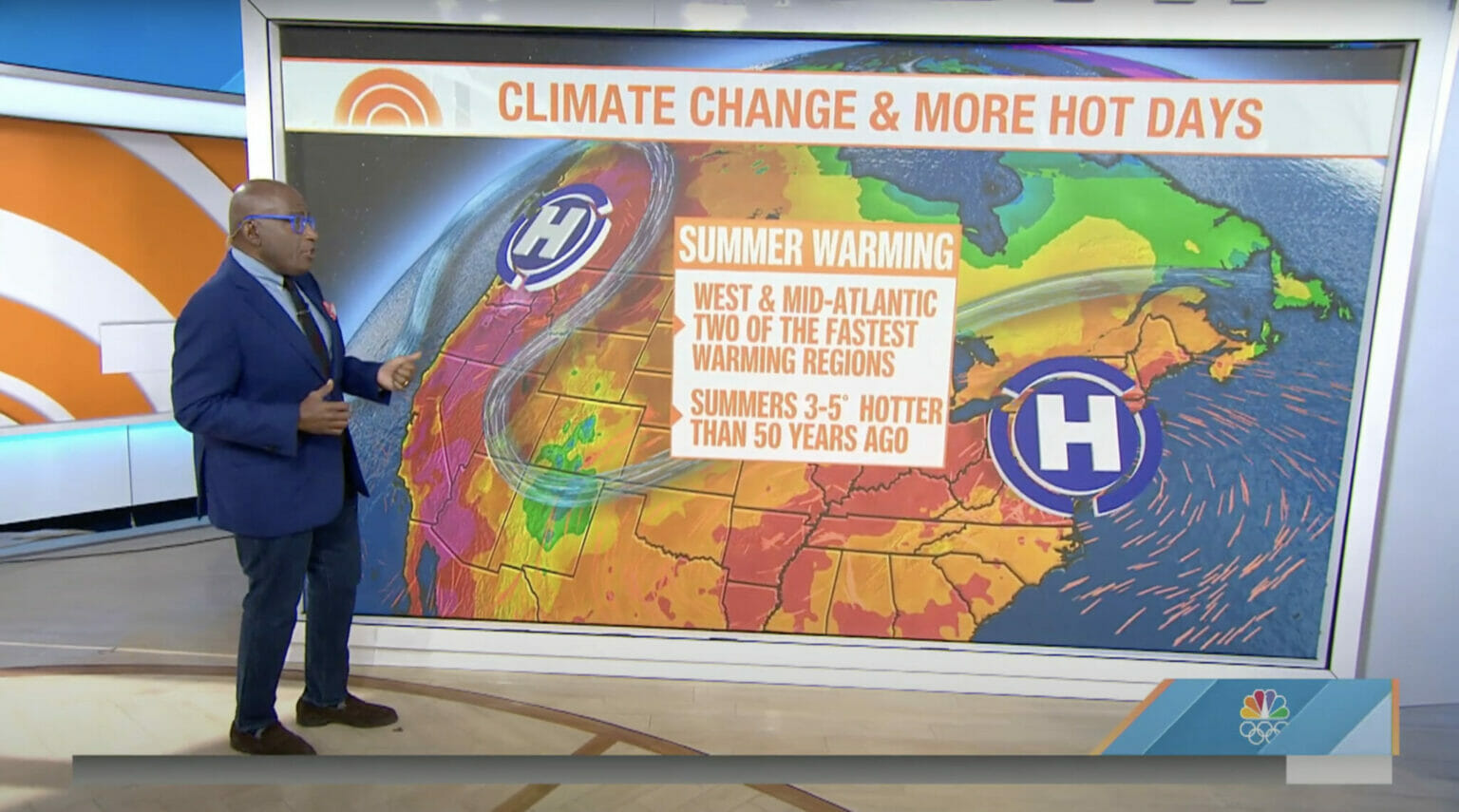Sign up to receive our weekly newsletter.
Last week in Tokyo, on a blistering Wednesday afternoon, Russian tennis star Deniil Medvedev visibly struggled during his third-round singles match against the Italian player Fabio Fognini. Medvedev had already called a medical timeout, and in the second set his performance prompted the umpire to ask him if he could continue. “I’m fine, I can finish the match,” Medvedev said. “But I can die.” He asked the umpire who would take responsibility if he did.
Summers in Tokyo are always brutal, but amid climate change they’re getting worse. Average temperatures in the city have climbed 2.9 degrees Celsius since 1900, more than three times the global average. During the Olympics, temperatures have consistently topped 32 degrees Celsius, (90 degrees Fahrenheit), with high humidity and heat indexes in the high-30s Celsius (about 100 degrees Fahrenheit). “Japan and Tokyo, in particular, are a microcosm for global warming,” one scientist told ABC News. “They probably give us a little more of a vision into what’s coming in the future.”
Medvedev—who won his match against Fognini but later lost in the quarterfinals to Spain’s Pablo Carreno—is hardly the only athlete to suffer the Olympics heat. That same Wednesday, Spanish tennis player Paula Badosa was taken off the court in a wheelchair due to heat stroke. The previous Friday, Russian archer Svetlana Gomboeva had fainted. And just yesterday, American golfer Lexi Thompson’s caddie, Jack Fulghum, had to be helped off the course after nearly passing out.
The Olympics remind us that climate change is truly a story for every beat. It’s a health story. It’s a sports story. In climate news, we so often focus on macro effects: monster storms, devastated neighborhoods and countryside, so many billions of dollars lost in damages. It’s sobering to remember that the climate emergency is also a story about our bodies, the conditions we humans are made to take and those we are not. As the renowned climate author Bill McKibben wrote recently for The New Yorker: “In the end, we’re not collections of constructs or ideas or images or demographics but collections of arteries and organs and muscles,” he wrote, “and those are designed to operate within a finite range of temperatures.”
It might seem an obvious point. But it’s one that every person on the planet will understand viscerally. In our journalism, it’s a part of the climate story we should tell more often.
NEWS FROM US
The climate connection, made easy. Evidence of climate change is all around us, but too often climate is absent from extreme weather reporting. CCNow has assembled a handy guide to help set your coverage straight. Print it out, pin it at your desk, email it to colleagues, share it with everyone in your newsroom. (We promise, making the connection is WAY easier than you think!) Check it out…
ESSENTIAL CLIMATE COVERAGE
“A good start,” they say. The US Senate’s $1 trillion bipartisan infrastructure deal contains some $150 billion to expand and bolster clean energy and boost climate resiliency across the country. But many central tenets of President Joe Biden’s climate plan are missing. The White House and other Democrats have pledged to do more with a $3.5 trillion deal soon, but its passage is far from secure. From the Associated Press…
Mile high lawsuit. As Colorado grapples with worsening wildfires, Boulder County is suing ExxonMobil and Suncor, a Canadian energy company with its US headquarters in Colorado, to demand they pay a fair share of local climate change mitigation efforts. Part of The Guardian’s ‘Climate Crimes’ series, in collaboration with CCNow, exploring decades of lies by the fossil fuel industry and new efforts to hold them accountable…
China’s coal. Despite pledges to reduce its greenhouse gas emissions, China is on track to expand its coal-fired energy production capacity to 1,400 gigawatts—on its own, three times the global limit on coal power set by the Intergovernmental Panel on Climate Change to limit global heating to below 2 degrees C. In an op-ed, Daniel K. Gardner, an expert on China’s environment, argues that President Biden must go all in on encouraging President Xi to reverse course, with the US and China together responsible for 40 percent of the world’s total carbon emissions. From the Los Angeles Times…
China’s flood. The catastrophic flooding in Henan province last month, which followed close on the heels of similar flooding in Germany, resulted in more than 300 deaths—triple that of previous estimates. From The New York Times…
All of our floods. Tens of millions of people worldwide have been moving into flood zones, according to a new study from the journal Nature. At a time when floods are becoming more frequent and worse, driven in part by human-caused climate change, that’s tens of millions more people who will suffer the floods’ consequences. From The Washington Post…
Note: This Friday, August 6, at 12 p.m., Andy Revkin of the Columbia Climate School will host a webinar with the Nature report’s authors to discuss these new findings. Learn more and sign up here…
Off the books. Companies across the US have pledged to cut emissions, but there’s a problem: carbon accounting standards are low, and the penalties for excess emissions are often non-existent. “Accurate or not, the company will likely come in for praise just for trying,” writes Akshat Rathi. “No matter how egregiously a carbon accountant messes up, they’re unlikely to see the inside of a jail.” From Bloomberg Green…
REPUBLICATION RECOMMENDATIONS
The following stories deserve special consideration for republication by CCNow partners:
- Climate crisis has cost Colorado billions—now it wants oil firms to pick up the bill — The Guardian
- Toxic “forever chemicals” suspected at oil sites across California — Capital & Main
For partner outlets: to submit stories for sharing, please use this form. Instructions for republishing and the full list of stories available for republication can be found in our Sharing Library.
COVERING THE IPCC’s WORKING GROUP I
Members of the Intergovernmental Panel on Climate Change’s Working Group I are meeting now to discuss the physical science of climate change and its implications for global policymakers, part of the Sixth Assessment Report process taking place this year and next. A press conference and report on the working group’s conclusions is due Monday, August 9. CCNow urges journalists not just to cover the report but to bring the science down to ground level for their audiences. Make it relevant, help folks connect, and take the opportunity to help audiences tune in to the all-important COP26 summit in Glasgow this November.
Climate Nexus webinar TODAY at 12 p.m. Eastern. Climate Nexus will host a webinar today reviewing the expected topic areas of the currently-embargoed report. It will also cover the scope and timing of the second and third working group meetings. Learn more and register now…
Additional resources. Help orient yourself to the IPCC process and plan your coverage.
- From the IPCC, here’s a fact sheet on the Sixth Assessment Report process, including information on each of the three working groups
- Here’s the IPCC’s interview request form, to get in touch with the Working Group I report’s authors.
- Watch a recording of a recent webinar hosted by the Society of Environmental Journalists, featuring IPCC Vice Chair Ko Barrett.
A critical measure of our COP26 coverage will be how we journalists make international bureaucracy and cooperation relevant to audiences—because they are, to all of us! Covering the IPCC Working Group I report should be good practice, while also being an essential story in its own right.
ODDS & ENDS
Jobs. Inside Climate News is hiring a senior editor for justice. Grist has openings for a content partnerships manager and digital producer for audience. USA Today is hiring a fellow to fact check climate misinformation. The Atlanta Journal-Constitution is hiring an enterprise reporter for environmental issues. And last but not least, The Washington Post is seeking freelance pitches for its Climate Solutions vertical.
Registration open for COP26. Journalists and other attendees can apply now to attend the COP26 global climate summit in Glasgow, set for October 31 to November 12. Registration information is here…
Thanks for reading, and see you next time!
If you have any feedback on this newsletter, or know of information that should be included here, shoot us a note at editors@coveringclimatenow.org.


